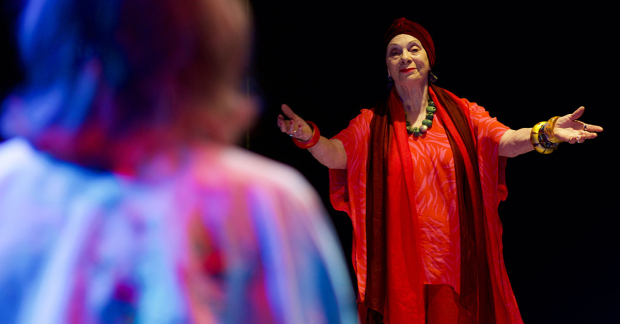”The Milk Train Doesn’t Stop Here Any More” at Charing Cross Theatre – review

© Nick Haeffner
In a 1965 interview, two years after it first flopped on Broadway, Tennessee Williams referred to The Milk Train Doesn’t Stop Here Any More as the play on which he worked the longest. Encountering it again, it certainly feels belaboured.
Even legends have their off days I guess, and this bizarre piece, overblown yet dramatically undernourished, feels as though it was probably a struggle to write; it’s certainly a bit of a struggle to sit through. Set in the secluded Amalfi Coast home of a wealthy but desperately ill American widow, protected by an encircling pack of wild dogs, it’s a dance of death long on camp and symbolism but short on human interest. There’s a direct line from Blanche DuBois and Cat On A Hot Tin Roof‘s Maggie through Alexandra Del Largo, the fading screen goddess of Sweet Bird of Youth, through to Mrs Flora Goforth, the imperious, insecure diva at the centre of Milk Train. The principal difference though is that where those other flawed, disappointed, once-celebrated women are written with an innate compassion and humanity, Flora is a flimsier, sourer creation, with a mile-wide mean streak, prone to extended monologues as she dictates her memoirs to a bemused assistant.
Her ongoing whingeing and self-mythologising is disrupted by the arrival of Chris Flanders, a handsome young poet and artist nicknamed the Angel of Death due to his penchant for turning up as a house guest to ultra-rich elderly matrons just at the point where they enter immortality. There is more than a suggestion that Flanders truly IS the personification of death, as the boundaries become blurred between reality and fantasy, memory and the present. It’s pretty preposterous stuff, and a long way from being top drawer Williams, although there are snatches of his characteristic verbal elegance and lyricism. Often it feels like something a lesser writer might come up with if challenged to create something in the style of the great Tennessee.
Linda Marlowe, a superb actress under usual circumstances who certainly has the requisite hauteur and spiky glamour to convince as a faded great beauty, makes a game stab at the leading role, but is ultimately defeated by the unwieldy prose Williams has provided her with, and the rather hesitant direction of Robert Chevara. Sara Kestelman, another stage great, fares better, and provides much needed comic relief, as Flora’s randy, gossipy rival-cum-sidekick known as the Witch of Capri. She elevates a moribund evening whenever she appears. Philip Prowse’s 1997 Lyric Hammersmith revival cast Rupert Everett and David Foxxe as Flora and the Witch respectively, and the semi-drag treatment improbably served the play rather better than this more straightforward rendition.
There’s nice work, brisk but sensitive, from Lucie Shorthouse as Blackie, the stoic but sensuous assistant. Sanee Raval’s strange performance as Flanders seems to be a victim of the character’s ambiguity however. He does a nice line in ardent enthusiasm but affects a glowering intensity in more portentous moments that comes across less as smouldering and more like catatonia, and Chevara’s direction gives him little help.
The pace for much of the show is painfully stilted, some of the blocking is awkward and the updating (mobile phones go off at regular intervals and Blackie carries a mini-iPad) feels at odds with the baroque speechifying and emoting. Nicolai Hart-Hansen’s traverse set successfully represents the various locales within the opulent coastal villa but is unhelpfully literal for a text that would probably benefit from a more dream-like, impressionistic approach.
Sad to say, there is a reason why some plays are seldom revived, and there is little here to suggest that this is a neglected masterpiece. One for Tennessee Williams completists only.













